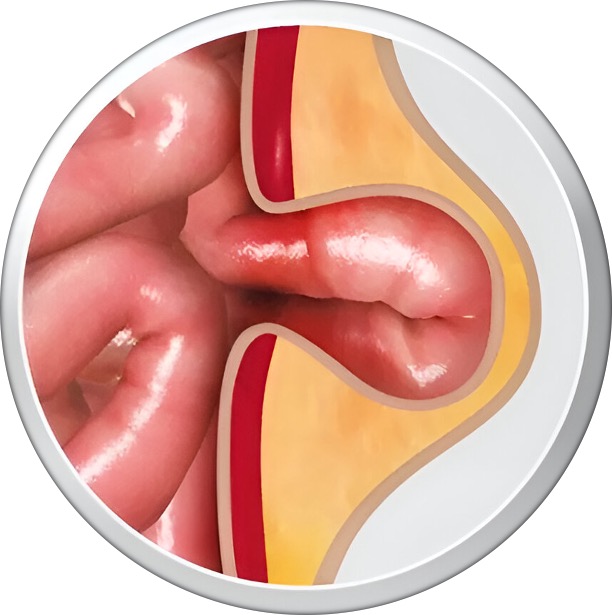Understanding Hernia
Causes and Treatments Explained
Discover the underlying causes of Hernia and explore effective treatment methods to manage and prevent it.
Understanding Hernia
Hernias affect about 5% of the global population, with inguinal hernias being the most common, representing 75% of all abdominal wall hernias. Annually, around 20 million hernia surgeries are performed worldwide. Men are more susceptible, with a lifetime risk of 27% compared to 3% in women. The prevalence increases with age, especially in those over 50.
What is Hernia?
Hernia is a medical condition that commonly occurs in individuals with weak muscles or underdeveloped tissues. It starts when an organ or part of the intestines is put under strain. As we age, our muscles tend to weaken further, and the pressure exerted in the same area can cause tissues and muscles to loosen, leading to the development of a hernia.
Medically, a hernia is defined as “the protrusion of the omentum or intestine through a defect,” which occurs when our abdominal organs push through a hole in the internal organ walls.

Causes of Hernia
Common Symptoms of Hernia
Types of Hernia
Understanding Hernia Health
Understanding the more about hernia specially the risks and potential complications of hernias highlights the importance of timely diagnosis, appropriate treatment, and ongoing management to ensure the best possible outcomes and prevent serious health issues.
Risks and Complications of Hernia
Hernias, if left untreated or not properly managed, can lead to a range of complications, some of which can be serious and life-threatening. Here are the general risks and complications associated with hernias:
1. Incarceration:
- Definition: When the herniated tissue becomes trapped and cannot be pushed back into the abdomen.
- Symptoms: Severe pain, tenderness, and possible bowel obstruction symptoms such as nausea, vomiting, and inability to pass gas or stool.
- Risk: Can lead to further complications like strangulation if not treated promptly.
2. Strangulation:
- Definition: Occurs when the blood supply to the herniated tissue is cut off, leading to tissue death.
- Symptoms: Sudden severe pain, redness or discoloration over the hernia, fever, and signs of sepsis (e.g., rapid heartbeat, confusion).
- Risk: This is a medical emergency requiring immediate surgical intervention to prevent life-threatening complications.
3. Bowel Obstruction:
- Definition: A blockage in the intestines caused by the herniated tissue obstructing the bowel.
- Symptoms: Cramping abdominal pain, nausea, vomiting, bloating, and inability to pass gas or stool.
- Risk: Can lead to severe dehydration, electrolyte imbalances, and bowel perforation if not treated promptly.
4. Testicular Atrophy (in men with inguinal hernias):
- Definition: Shrinkage of the testicles due to compromised blood supply.
- Symptoms: Decreased testicular size and potential loss of function.
- Risk: Rare, but can affect fertility and hormone production.
How to Diagnose Hernia?
Diagnosing a hernia involves taking a detailed medical history to understand symptoms and risk factors. A physical examination is conducted to visually inspect and palpate the affected area for a bulge. Imaging tests like ultrasound, CT scans, or MRI may be used to confirm the diagnosis, especially if the hernia is not easily visible or if complications are suspected. Dynamic maneuvers such as the cough test may help in detecting hernias. Differential diagnosis is important to rule out other conditions. Early diagnosis ensures timely treatment to prevent complications. Prompt medical attention is crucial if hernia symptoms are suspected.
Treatment Options of Enlarged Prostate
Timely treatment of hernia is essential to alleviate symptoms, prevent complications, and restore quality of life. Ignoring hernia symptoms can lead to increased discomfort and potential risks such as bowel obstruction or strangulation, highlighting the importance of seeking medical care promptly.
The choice of treatment depends on factors such as the size and location of the hernia, symptoms, patient’s overall health, and surgeon’s expertise. It’s important to consult a healthcare professional for proper evaluation and individualized treatment recommendations.
Treatment options for hernia typically include:
- Watchful Waiting: For small, asymptomatic hernias, especially in elderly patients or those with significant medical issues, a watch-and-wait approach may be recommended with regular monitoring.
- Lifestyle Changes: For individuals with mild symptoms or to prevent worsening, lifestyle modifications such as weight loss, avoiding heavy lifting, and proper posture can be beneficial.
- Medications: Medications may be prescribed to manage symptoms like pain or discomfort associated with hernia, but they do not treat the hernia itself.
- Hernia Trusses: In some cases, a hernia truss (a supportive device) may be used to apply gentle pressure to keep the hernia reduced, although this is not commonly recommended due to potential complications.
- Emergency Surgery: If a hernia becomes incarcerated (trapped and unable to be pushed back in) or strangulated (blood supply to the trapped tissue is compromised), emergency surgery is required to prevent tissue damage or death.
- Surgical Repair (Hernia Repair Surgery): This is the most common and effective treatment for hernias. Surgical options include:
-
- Open Hernia Repair: Involves making an incision directly over the hernia, pushing the protruding tissue back into place, and then reinforcing the weakened area with sutures or mesh.
- Laparoscopic Hernia Repair: A minimally invasive procedure where small incisions are made, and a laparoscope (a thin tube with a camera) is used to guide the repair with mesh placement.
-
Get Expert Help Today
Don’t let a hernia interfere with your daily life. Contact Max Stone & Surgical Center – Max Hospital Faridabad – for a comprehensive consultation and personalized treatment plan. Our expert team is committed to delivering exceptional care and support. Schedule your appointment today.


Get a Call for Appointment
Fill out this form to receive a call from us and schedule your appointment. Start your journey to better health with our expert care today!
